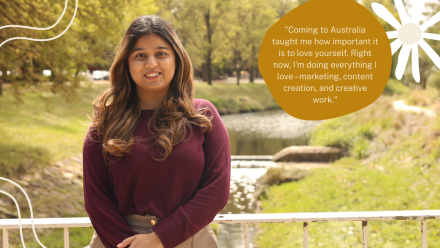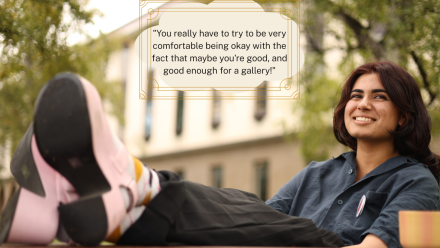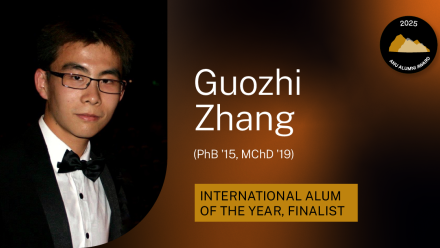ANU Spaces – Rosanna Stevens
Meet Rosanna Stevens, the 2014 winner of the 3 Minute Thesis competition at ANU.
Rosanna, what do you do at ANU?
I’m a PhD candidate here at the ANU. I’m at the School of Archaeology and Anthropology at the Research School of Humanities and the Arts. You can find me over at the Roland Wilson Building most days.
What is your favourite spot on campus?
That’s a tough one. I think I have a couple. Definitely my office is a really nice spot. I really love Roland Wilson and the staff – I feel really comfortable there.
But if I had to pick a café, I’d pick Gods at Hedley Bull. They do the best coffee and it’s a really relaxed place and also anywhere outdoors on campus I really love.
You like it because…
It’s one of the things I like about ANU. I came from the University of Technology Sydney which was a great university for my undergrad. But we didn’t really have many lawns to sit on. So it’s a really different culture to be able to come and sit down and talk to people about their work, and see Acro-Yoga happening out the front of Chifley Library at lunchtime.
If you were free for an afternoon, you would…
I actually really love getting lost out the back of Black Mountain. There are a couple of different bushwalks that you can take and it’s just so beautiful out there and so peaceful. It’s incredible that it’s so close to the city so I love to go and gather my thoughts there. It reminds me a lot of the Blue Mountains, where I’m from.
Congratulations on winning this year’s 3MT competition. Can you tell us what you spoke about?
In my 3 Minute Thesis I spoke about a field of research that isn’t often known about in popular society and that is the field that academics call critical whiteness studies and race studies. It’s looking at how it’s this invisible dominant presence in society. So in my 3 Minute Thesis I grapple with the idea of what whiteness is and how can we look at it and understand it to see what it does to other people.
What has been the best part of winning the competition and participating in 3MT?
I think it would absolutely come down to participating and not winning. I didn’t care if I won or not and I hope that none of the other competitors did either.
One of the great things about the competition is there is a sense of camaraderie amongst the speakers. I really admire the perseverance and modesty and the passion that the other researchers had.
Just before the final I grabbed a drink with one of the other speakers and he was talking about his PhD. He was just so passionate about the geological field and I actually started to check myself and think ‘am I this passionate about my research? I hope so.’ It just reminded me that even though we were there to speak on the stage, we all really love what we do because we all really believe it is changing something and change is good.
What did you win?
3 Minute Thesis features very lucrative prizes. In the final I won the people’s choice award which was a $500 research grant to spend as I wished on travel. First place was a $4,000 research travel grant as well. So in total I cleaned up, but I was very surprised.
But the most fun has been seeing people get involved, particularly on social media. I was actually really stoked when I saw people from the public getting up and claiming prizes on the finals night and saying ‘yeah I was involved in the competition too and I got some sweet stuff out of this’.
What will you be using the money for?
There are a couple of conferences that I am keen to attend. One, in Brisbane towards the end of the year that was founded by one of the women who has completely changed the way that I look at critical whiteness studies. Her name is Aileen Moreton-Robinson and she, in Australia certainly began to found many of the ideas just before 2000 about what critical whiteness studies would look like and why it was pertinent. So I am both very intimidated to attend that conference but I’d be very stupid not to go.
What has been the benefit, for you personally, in participating in 3MT?
I think first and foremost it has helped me clarify what the crux of my thesis is which is always a really important thing to be answerable to. Other than that, the main reason why I participated in the 3 Minute Thesis is because I have a very very staunch belief that as a researcher I have a responsibility to the public.
Was it a challenge describing your research in just three minutes? How did you tackle this challenge?
I think when you do the 3 Minute Thesis, you cannot expect to actually fit your whole thesis in 80,000 words into 3 minutes. So I picked one element of my thesis. I knew if I got on that stage and said my thesis is a novel and it’s exploring the lives of these characters doing this thing and kind of exploring this idea and also doing critical whiteness studies, people would have said ‘I don’t understand, I’m done, I’m out, thankyou’. I didn’t want that, I wanted to communicate a clear message. So what I ended up communicating is actually a concept that a lot of other researchers look at in their work. It’s just that I was the one talking about it on the stage at the time and I don’t claim the crux of the issues I was talking about was all innovative on my part. They are pieces of work largely articulated by Aboriginal and black academics and activists and I just have the incredible responsibility to communicate them in a way that is hopefully creating social change.
What advice would you give to students thinking about entering the competition in future?
I’d say two things. Firstly just do it. Because the number of people who sign up and just drop out kills me. It’s just a matter of proving to yourself that you can get up there and say something.
The second thing I’d say is when you’re writing your 3 Minute Thesis, deliver it to you friends, and make sure that they feel comfortable saying to you ‘I don’t even understand what you were saying just then but I love you and I love your research. Let’s find another way to say it.’ I think that it’s really important that 3 Minute Thesis competitors understand that even though we’re expected to communicate our research to an audience, it doesn’t mean that the lay audience doesn’t understand anything they’re saying. So talk to your audience like they’re your friends and be relaxed because people relate to that and it’s really exciting.


